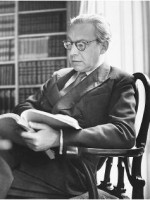Hugh St Clair Stewart is a Director, Associate Producer, Editor and Supervising Art Director British born on 14 december 1910 at Falmouth (United-kingdom)

Hugh St Clair Stewart MBE (14 December 1910 – 31 May 2011) was a British film editor and producer whose notable contributions included filming Bergen-Belsen concentration camp following its liberation in April 1945.
Born in Falmouth, England, Stewart was educated first at Clayesmore School and then at St John’s College at Cambridge where was taught and influenced by F. R. Leavis. He entered the film industry in the early 1930s. He trained as a film editor at Gaumont-British, initially cutting together out-takes from Marry Me (1932) and working as assembly cutter on The Constant Nymph that same year. His first film as editor was Forbidden Territory (1934). Among the films he cut were Evergreen (1934), Alfred Hitchcock’s original version of The Man Who Knew Too Much (1934), Dark Journey (1937), Action for Slander (1937), South Riding (1938), St. Martin’s Lane (1938), and The Spy in Black (1939).
During World War II, Stewart was commissioned into the Army Film and Photographic Unit (AFPU) in 1940 and in 1942 led No. 2 AFPU during the Allied landings in Tunisia. The following year he edited film footage from the fighting into the documentary Desert Victory. In 1944 he co-directed Tunisian Victory with Frank Capra and John Houston, although much of that film was shot in the United States. Stewart went on to lead No. 5 AFPU, covering the D-Day landings, the Battle for Caen and the Rhine Crossing.
Perhaps Stewart's most notable contribution to film resulted from his insistence on filming Bergen-Belsen concentration camp following its liberation, with its piles of bodies being bulldozed into mass graves, its overcrowded barrack blocks and pitifully emaciated survivors.
He was awarded a military MBE and demobilized with the rank of lieutenant-colonel.
After World War II, Stewart became a film producer, beginning with Trottie True (1949). He began to produce the films of comedian Norman Wisdom, from Man of the Moment (1955) onwards, and the comedy duo of Morecambe and Wise. Although he went into semi-retirement in the late 1960s, he produced several films for the Children's Film Foundation, including All At Sea (1970), Mr. Horatio Knibbles (1971), and High Rise Donkey (1980).
He died on 31 May 2011, at the age of 100.
Lorsque la Seconde Guerre mondiale éclate, il rejoint le Régiment royal d'artillerie (Royal Artillery). Il est affecté au Army Film and Photographic Unit en décembre 1940 et à ce titre couvre le débarquement allié en Tunisie en novembre 1942. L'année suivante, il utilise les scènes de combat filmées pour le montage de Victoire du désert (Desert Victory), documentaire britannique réalisé par David MacDonald. Il participe également Tunisian Victory (1944), qu'il coréalise avec notamment Frank Capra et John Huston. Il couvre également le débarquement de Normandie, la traversée du Rhin, la bataille des Ardennes, mais aussi la libération du camp de Bergen-Belsen. En 1945 il est fait membre de l'Ordre de l'Empire britannique à titre militaire et est démobilisé avec le grade de lieutenant-colonel.
De retour en Angleterre, Stewart rejoint Earl St. John aux Pinewood Studios et commence une carrière de producteur avec the Rank Organisation. Son premier film en tant que tel est Ma gaie lady (Trottie True). Il produira notamment plusieurs des films de Norman Wisdom.
Source : Wikidata
Hugh St Clair Stewart

- Infos
- Photos
- Best films
- Family
- Characters
- Awards
Birth name Hugh St Clair Stewart
Nationality United-kingdom
Birth 14 december 1910 at Falmouth (United-kingdom)
Death 31 may 2011 (at 100 years) at Denham (United-kingdom)
Awards Member of the Most Excellent Order of the British Empire
Nationality United-kingdom
Birth 14 december 1910 at Falmouth (United-kingdom)
Death 31 may 2011 (at 100 years) at Denham (United-kingdom)
Awards Member of the Most Excellent Order of the British Empire
Born in Falmouth, England, Stewart was educated first at Clayesmore School and then at St John’s College at Cambridge where was taught and influenced by F. R. Leavis. He entered the film industry in the early 1930s. He trained as a film editor at Gaumont-British, initially cutting together out-takes from Marry Me (1932) and working as assembly cutter on The Constant Nymph that same year. His first film as editor was Forbidden Territory (1934). Among the films he cut were Evergreen (1934), Alfred Hitchcock’s original version of The Man Who Knew Too Much (1934), Dark Journey (1937), Action for Slander (1937), South Riding (1938), St. Martin’s Lane (1938), and The Spy in Black (1939).
During World War II, Stewart was commissioned into the Army Film and Photographic Unit (AFPU) in 1940 and in 1942 led No. 2 AFPU during the Allied landings in Tunisia. The following year he edited film footage from the fighting into the documentary Desert Victory. In 1944 he co-directed Tunisian Victory with Frank Capra and John Houston, although much of that film was shot in the United States. Stewart went on to lead No. 5 AFPU, covering the D-Day landings, the Battle for Caen and the Rhine Crossing.
Perhaps Stewart's most notable contribution to film resulted from his insistence on filming Bergen-Belsen concentration camp following its liberation, with its piles of bodies being bulldozed into mass graves, its overcrowded barrack blocks and pitifully emaciated survivors.
He was awarded a military MBE and demobilized with the rank of lieutenant-colonel.
After World War II, Stewart became a film producer, beginning with Trottie True (1949). He began to produce the films of comedian Norman Wisdom, from Man of the Moment (1955) onwards, and the comedy duo of Morecambe and Wise. Although he went into semi-retirement in the late 1960s, he produced several films for the Children's Film Foundation, including All At Sea (1970), Mr. Horatio Knibbles (1971), and High Rise Donkey (1980).
He died on 31 May 2011, at the age of 100.
Biography
Hugh St Clair Stewart étudie l'anglais au St John's College à Cambridge, où il eut notamment comme professeur F. R. Leavis. Après son diplôme, il rejoint la Gaumont British Picture Corporation, puis London Films. Alfred Hitchcock lui confie alors le montage de L'Homme qui en savait trop (The Man Who Knew Too Much) en 1934.Lorsque la Seconde Guerre mondiale éclate, il rejoint le Régiment royal d'artillerie (Royal Artillery). Il est affecté au Army Film and Photographic Unit en décembre 1940 et à ce titre couvre le débarquement allié en Tunisie en novembre 1942. L'année suivante, il utilise les scènes de combat filmées pour le montage de Victoire du désert (Desert Victory), documentaire britannique réalisé par David MacDonald. Il participe également Tunisian Victory (1944), qu'il coréalise avec notamment Frank Capra et John Huston. Il couvre également le débarquement de Normandie, la traversée du Rhin, la bataille des Ardennes, mais aussi la libération du camp de Bergen-Belsen. En 1945 il est fait membre de l'Ordre de l'Empire britannique à titre militaire et est démobilisé avec le grade de lieutenant-colonel.
De retour en Angleterre, Stewart rejoint Earl St. John aux Pinewood Studios et commence une carrière de producteur avec the Rank Organisation. Son premier film en tant que tel est Ma gaie lady (Trottie True). Il produira notamment plusieurs des films de Norman Wisdom.
Best films
Usually with
Filmography of Hugh St Clair Stewart (31 films)
Director

Tunisian Victory (1944)
, 1h15Directed by John Huston, Frank Capra, John Boulting, Roy Boulting, Hugh St Clair Stewart
Origin United-kingdom
Genres War, Documentary
Themes Documentary films about war, Documentary films about historical events, Political films, Documentary films about World War II
Actors Leo Genn, Burgess Meredith, Bernard Miles
Rating65%





Producer

The Magnificent Two (1967)
, 1h40Directed by Cliff Owen
Genres Comedy
Actors Eric Morecambe, Ernie Wise, Margit Saad, Virgílio Teixeira, Cecil Parker, Isobel Black
Roles Producer
Rating51%





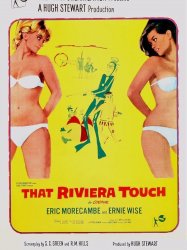
That Riviera Touch (1966)
, 1h38Directed by Cliff Owen
Genres Comedy
Actors Eric Morecambe, Ernie Wise, Suzanne Lloyd, Armand Mestral, George Pastell, Alexandra Bastedo
Roles Producer
Rating58%





After Eric Simpson (Eric Morecambe) nearly gives the Queen a parking ticket, he and Ernest Clark (Ernie Wise) decide to take a holiday in the South of France. However, when they arrive there, they become unwittingly involved in a jewel theft when the thief Le Pirate (Paul Stassino) decides to use them to smuggle some precious jewels out of the country. He sends the two Englishmen to a sinister villa and sends the beautiful Claudette (Suzanne Lloyd), a member of his criminal gang, to keep Eric and Ernie occupied while he carries out the various stages of his plan. Confusion ensues however, as the two battle for the affections of Claudette and Eric accidentally wins a large sum of money at a casino. Eventually Eric and Ernie start to get suspicious and begin to investigate.
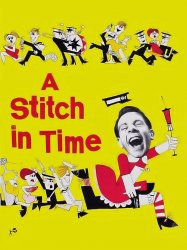
A Stitch in Time (1963)
, 1h29Directed by Robert Asher
Origin United-kingdom
Genres Comedy
Actors Edward Chapman, Norman Wisdom, Jerry Desmonde, Wanda Ventham, Marianne Stone, Glyn Houston
Roles Producer
Rating68%





Norman Pitkin is the apprentice to Mr Grimsdale an old fashioned butcher. When the store is raided by a young thug (Johnny Briggs), Mr Grimsdale (at Norman's suggestion) puts his gold watch in his mouth for safe keeping. The result of which leads to Mr Grimsdale accidentally swallowing the watch and sent to hospital. Whilst visiting Mr Grimsdale, Norman (in his usual way) accidentally causes chaos around the hospital and meets a girl called Lindy who hasn't spoken since her parents were killed in an aeroplane accident. After Norman is unable to visit Lindy as he is banned from hospital he and Mr. Grimsdale join the St. John Ambulance Brigade which gives him the excuse to visit her, as usual chaos ensues, and in the end Lindy visits him at a charity ball where the St John Ambulance Brigade Band are performing, the ball descends into the inevitable chaos, caused entirely by Norman, but Norman redeems himself (and the reputation of the Brigade) as he addresses those attending the ball and everyone donates money for the charity.

In the Doghouse (1962)
, 1h35Directed by Darcy Conyers
Origin United-kingdom
Genres Drama, Comedy
Actors Leslie Phillips, Hattie Jacques, Peggy Cummins, James Booth, Joan Hickson, Colin Gordon
Roles Producer
Rating60%





A newly qualified vet with a heart of gold takes over an old practice and becomes rivals with another vet.

On the Beat (1962)
, 1h46Directed by Robert Asher
Origin United-kingdom
Genres Comedy
Themes Sports films, Association football films
Actors Norman Wisdom, Jennifer Jayne, Esma Cannon, Raymond Huntley, Eric Barker, Wanda Ventham
Roles Producer
Rating68%





Norman Pitkin (Norman Wisdom) works at Scotland Yard as a car cleaner but dreams of becoming a policeman like his late father. The police reject his request to join the force but recruit him to work undercover in disguise as the double of a suspected jewel thief, an Italian crime boss who looks just like him. In addition to his criminal activities this man is a ladies' hairdresser. Norman disguises himself as the suspect and gains entry to his salon. Once inside, after some mishaps, he manages to find the stolen goods, knock out the suspect, wrap him up in a curtain/wall rug, and bring him to justice. As a reward, he is offered a permanent place in the police and marries his love, the ex-girlfriend of the man he brought to justice (whom had he rescued earlier in the film when she was attempting to commit suicide by jumping in the river).
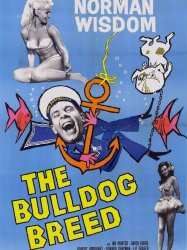
The Bulldog Breed (1960)
, 1h37Directed by Robert Asher
Origin United-kingdom
Genres Comedy
Themes Military humor in film, Seafaring films, Transport films
Actors Norman Wisdom, Ian Hunter, David Lodge, Robert Urquhart, Edward Chapman, Eddie Byrne
Roles Producer
Rating60%





Norman Puckle (Norman Wisdom), a well-meaning but clumsy grocer's assistant, cannot seem to do anything right. After being rejected by Marlene, the love of his life, he attempts suicide, but cannot even do that. He is saved from jumping off a cliff at 'Lover's Leap' by a Royal Navy petty officer. He persuades Puckle to join the Royal Navy, where he will meet 'lots of girls'.
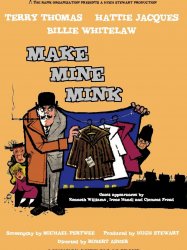
Make Mine Mink (1960)
, 1h41Directed by Robert Asher
Origin United-kingdom
Genres Drama, Comedy
Themes Théâtre, Films based on plays
Actors Terry-Thomas, Athene Seyler, Hattie Jacques, Elspeth Duxbury, Billie Whitelaw, Jack Hedley
Roles Producer
Rating69%





A group of lodgers - Major Rayne, Nanette and Pinkie - staying at the home of Dame Beatrice, a formerly wealthy old lady, express boredom with their humdrum lives. A chance for some excitement comes when Lily, Dame Beatrice's beautiful, young housekeeper, one day gives in to temptation and lifts a brand new mink coat from their neighbours. She does this in a misguided attempt to thank Dame Bea by replacing a moth-eaten, and thoroughly worn-out old fur. Dame Bea is at first delighted, but upon learning how Lily came by the coat she, and her lodgers, spring into action with a plan to replace the coat without anyone knowing.
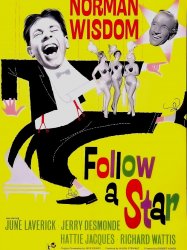
Follow a Star (1959)
, 1h42Directed by Robert Asher
Origin United-kingdom
Genres Comedy, Musical
Themes Films about music and musicians, Musical films
Actors June Laverick, Norman Wisdom, Jerry Desmonde, Dick Emery, Hattie Jacques, Richard Wattis
Roles Producer
Rating64%





The story is rather similar to the ending of Singin' in the Rain, where a singer fraudulently "borrows" the voice of Norman Wisdom's character.
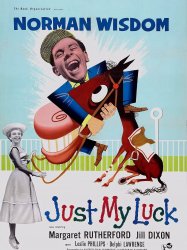
Just My Luck (1957)
, 1h26Directed by John Paddy Carstairs
Origin United-kingdom
Genres Comedy
Themes Sports films
Actors Margaret Rutherford, Norman Wisdom, Leslie Phillips, Jill Dixon, Delphi Lawrence, Joan Sims
Roles Producer
Rating60%





Norman Hackett (Norman Wisdom) works in a jewellers workshop and dreams about meeting the shop window dresser over the road from his workshop.

Up in the World (1956)
, 1h27Directed by John Paddy Carstairs
Origin United-kingdom
Genres Comedy
Themes Sports films, Association football films
Actors Maureen Swanson, Norman Wisdom, Jerry Desmonde, Michael Caridia, Colin Gordon, Ambrosine Phillpotts
Roles Producer
Rating64%





Un laveur de vitres empêche le fils du manoir où il travaille d'être kidnappé.
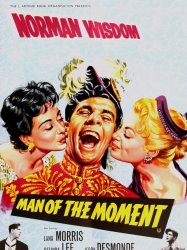
Man of the Moment (1955)
, 1h28Directed by John Paddy Carstairs
Origin United-kingdom
Genres Comedy
Themes Monde imaginaire
Actors Lana Morris, Norman Wisdom, Belinda Lee, Jerry Desmonde, Karel Štěpánek, Garry Marsh
Roles Producer
Rating62%





Faute de trouver quelqu'un de disponible, Norman, un employé du ministère de l'Outre-Mer, est envoyé représenter le Royaume-Uni lors d'une conférence à Genève. Accidentellement, il vote contre une motion qui aurait permis une intervention étrangère dans les affaires de Tawaki, une paisible nation du Pacifique. Ce vote lui fait gagner la gratitude de la reine de Tawaki, qui lui laisse toute latitude à propos des affaires de son pays.

The Long Memory (1953)
, 1h36Directed by Robert Hamer
Origin United-kingdom
Genres Thriller, Noir, Crime
Actors John Mills, John McCallum, Elizabeth Sellars, Geoffrey Keen, Michael Martin Harvey, John Chandos
Roles Producer
Rating69%





The protagonist, Davidson (John Mills), visits the boat of Captain Driver to ask permission to marry his daughter Fay. Aboard, he finds himself involved in a fight over the criminal activities of Boyd, a people trafficker with whom the Drivers are associated. The boat catches fire, and subsequent investigation finds aboard a charred corpse, Boyd having gone missing. The corpse is actually a client Boyd killed, but to cover up their involvement, the Drivers and another associate, Tim Pewsey, perjure themselves by claiming there was no other man present. This leads to the identification of the corpse as Boyd and to Davidson's conviction for his murder. He spends 12 years in prison.

Night Without Stars (1951)
Directed by Anthony Pelissier
Origin United-kingdom
Genres Crime
Themes Political films
Actors David Farrar, Nadia Gray, Maurice Teynac, Gérard Landry, June Clyde, Robert Ayres
Roles Producer
Rating60%





When English lawyer Giles Gordon (David Farrar), partially blinded during service in World War II, retires to the French Riviera, he meets and falls in love with shop girl Alix Delaisse (Nadia Gray), the widow of a French Resistance fighter. Restaurateur Pierre Chava (Gérard Landry) approaches Giles and warns him off with the claim that Alix is already promised to him. He tells Giles that Alix is involved with black marketers, blackmailers and murderers from the war years and demands that Giles forget her and return to England.

Trottie True (1949)
, 1h36Directed by Brian Desmond Hurst
Origin United-kingdom
Genres Drama, Comedy, Musical
Themes Musical films
Actors Jean Kent, James Donald, Hugh Sinclair, Christopher Lee, Lana Morris, Roger Moore
Roles Producer
Rating57%





En 1900, une duchesse se remémore ce qui l'a amenée à cette position sociale. Après s'être fait un nom au music-hall, celle qui s'appelait alors Trottie True est engagée pour rejoindre la troupe du Bedford. Là elle attire l'attention de plusieurs admirateurs bien nés, et notamment de Lord Digby Landon avec qui elle se mariera.
 Connection
Connection



